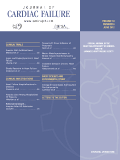
JOURNAL OF CARDIAC FAILURE
Scope & Guideline
Empowering Clinicians with Evidence-Based Knowledge
Introduction
Aims and Scopes
- Heart Failure Management:
Research on clinical strategies, medical therapies, and novel interventions aimed at improving outcomes for patients with heart failure. - Pathophysiology of Heart Failure:
Studies exploring the underlying biological mechanisms of heart failure, including genetic, molecular, and hemodynamic factors. - Epidemiology and Health Disparities:
Investigating the prevalence, risk factors, and outcomes of heart failure across different populations, emphasizing the impact of social determinants of health. - Technological Innovations:
Research on the application of new technologies, including remote monitoring, telehealth, and artificial intelligence, in the management of heart failure. - Patient-Centered Care and Quality of Life:
Studies focusing on the experiences, preferences, and quality of life of heart failure patients, including psychosocial aspects and caregiver support. - Interventional Strategies:
Research on surgical and procedural interventions, such as left ventricular assist devices (LVADs) and heart transplantation, and their outcomes.
Trending and Emerging
- Heart Failure with Preserved Ejection Fraction (HFpEF):
An increasing number of studies focus on the complexities of HFpEF, including its pathophysiology, diagnostic challenges, and treatment strategies. - Integration of Digital Health Technologies:
Research on telehealth, remote monitoring, and digital health applications is rapidly expanding, emphasizing their role in managing heart failure. - Social Determinants of Health:
There is a growing emphasis on understanding how socioeconomic factors impact heart failure outcomes, with a focus on equity and access to care. - Advanced Therapeutics:
The exploration of novel therapeutic agents, including SGLT2 inhibitors and gene therapies, is becoming more prominent as treatment options diversify. - Multidisciplinary Care Models:
The trend towards integrated care models that involve various healthcare professionals in heart failure management is gaining traction, highlighting the importance of collaborative approaches. - Patient Engagement and Shared Decision-Making:
Research is increasingly focusing on the role of patient preferences and shared decision-making in improving heart failure management and outcomes.
Declining or Waning
- Traditional Pharmacotherapy:
As newer therapies and personalized medicine approaches emerge, the focus on traditional pharmacological treatments for heart failure may be diminishing. - Basic Science Studies:
Research that primarily explores basic science without direct clinical application has seen reduced publication frequency as the journal emphasizes translational research. - Single-Center Studies:
There has been a shift away from single-center studies towards larger, multi-center trials that provide more generalizable data and insights. - Non-urgent Clinical Guidelines:
With the rapid development of heart failure management guidelines, older, non-urgent clinical guidelines may be receiving less attention in favor of more contemporary approaches. - Aging Research in Heart Failure:
Interest in the specific aging-related aspects of heart failure has declined as research trends shift towards broader population health and health disparity issues.
Similar Journals
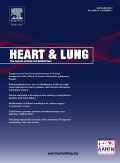
HEART & LUNG
Exploring the Frontiers of Cardiovascular and Respiratory MedicineHEART & LUNG is a premier academic journal published by MOSBY-ELSEVIER, focusing on the critical intersections of cardiology, critical care, and respiratory medicine. Since its inception in 1973, the journal has established a significant reputation within the medical community, as evidenced by its impressive Q2 ranking in key categories such as Cardiology and Cardiovascular Medicine, Critical Care and Intensive Care Medicine, and Pulmonary and Respiratory Medicine for the year 2023. With a dedicated readership comprising researchers, healthcare professionals, and students, HEART & LUNG serves as a vital platform for disseminating cutting-edge research, clinical innovations, and comprehensive reviews that influence practice standards and enhance patient care. While it currently does not offer Open Access options, readers can access a wealth of information pivotal to the advancement of medical knowledge and practice through conventional subscription. Explore the latest findings and contribute to the ever-evolving landscape of cardiovascular and respiratory health through this esteemed journal.

Journal fur Kardiologie
Illuminating the Path of Cardiovascular Innovation.The Journal fur Kardiologie, published by KRAUSE & PACHERNEGG GMBH, is a pivotal resource in the field of Cardiology and Cardiovascular Medicine. With an ISSN of 1024-0098 and an E-ISSN of 1680-936X, this journal has played a significant role in disseminating valuable research and clinical studies from 1998 until its coverage discontinuation in Scopus in 2017. Despite its Scopus rank being relatively low at #316/324 in its category, it continues to serve as a platform for emerging cardiology research. The journal’s scope encompasses various aspects of cardiovascular health, providing insights that are crucial for researchers, professionals, and students alike seeking to advance their knowledge and practice in cardiology. While the journal is not open access, its contributions to the field are essential for those looking to stay informed about the latest developments in cardiovascular medicine.

Journal of Cardiovascular Development and Disease
Exploring the frontiers of cardiac development and disease.Journal of Cardiovascular Development and Disease, an esteemed publication by MDPI, has been a dedicated platform for disseminating cutting-edge research since its inception in 2014. Based in Switzerland, this Open Access journal not only provides unrestricted access to its content but also fosters global collaboration among scholars focusing on cardiovascular health and disease development. With an impressive focus classified as Q1 in Pharmacology, Toxicology and Pharmaceutics for 2023, it attracts a diverse range of interdisciplinary research, supporting advancements in pharmacological applications relevant to cardiac conditions. The journal's ongoing convergence through 2024 highlights its commitment to the evolving landscape of cardiovascular research, making it a vital resource for researchers, professionals, and students alike who are keen to contribute to and learn from significant developments in this critical field.

Pakistan Heart Journal
Empowering Cardiology Through Open Access Insights.Pakistan Heart Journal, with the ISSN 0048-2706 and E-ISSN 2227-9199, is a premier publication by the Pakistan Cardiac Society, dedicated to advancing the field of cardiology and cardiovascular medicine. Established as an Open Access journal since 2011, it provides a valuable platform for researchers and clinicians to disseminate innovative findings and insights within this critical area of health. Based in Karachi, Pakistan, at the National Institute of Cardiovascular Diseases, this journal aims to foster an enriched understanding of cardiovascular health by publishing rigorous research, case studies, and review articles. Despite its current categorization as Q4 in the latest 2023 quartiles and a rank of 357/387 in the Scopus database, it plays a vital role in the academic community, encouraging collaborative efforts and dialogue among professionals. The journal aspires to converge diverse perspectives and innovations in cardiology from 2019 to 2024, thereby enhancing the quality and scope of cardiovascular research in the region and beyond.

Frontiers in Cardiovascular Medicine
Elevating Cardiovascular Research Through Open Access.Frontiers in Cardiovascular Medicine is a leading open-access journal published by FRONTIERS MEDIA SA, dedicated to advancing research in the field of cardiology and cardiovascular medicine. Since its inception in 2014, the journal has become a vital platform for the dissemination of high-quality research, boasting a commendable Q2 rank in the 2023 category for Cardiology and Cardiovascular Medicine. With a focus on promoting innovative studies and clinical insights, Frontiers in Cardiovascular Medicine facilitates open access to its content, allowing researchers, healthcare professionals, and students from around the globe to engage with the latest findings which are critical for the advancement of cardiovascular health. The journal's significant presence in the academic landscape, as indicated by its Scopus ranking (161/387 and 58th percentile), underscores its importance as a research outlet in this essential field. Located in Lausanne, Switzerland, the journal continues to support the global cardiovascular community by encouraging collaboration and knowledge sharing to address the challenges faced in cardiovascular medicine today.
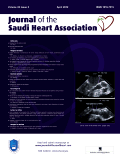
Journal of the Saudi Heart Association
Pioneering Insights in Cardiovascular Medicine Since 2009The Journal of the Saudi Heart Association is a prominent scholarly publication dedicated to advancing knowledge in the fields of cardiology and cardiovascular medicine. Published by DIGITAL COMMONS BEPRESS, this open-access journal has been serving the global community since 2009, providing a vital platform for researchers, practitioners, and students interested in the latest developments in heart health and disease management. With an ISSN of 1016-7315 and a growing repository of knowledge alongside an E-ISSN of 2212-5043, the journal showcases an array of peer-reviewed articles that contribute to the understanding of cardiovascular conditions. Although categorized in the Q4 quartile for 2023, it remains committed to offering valuable insights, particularly within the constraints of the 29th percentile rank specified by Scopus. As the journal converges towards 2024, it continues to foster collaboration, innovation, and inquiry within the Saudi Arabian and international medical communities.

Heart International
Connecting researchers and clinicians in the pursuit of heart health.Heart International is a prominent open-access journal dedicated to the fields of cardiology and cardiovascular medicine, published by TOUCH MEDICAL MEDIA LTD since 2006. Based in Italy, this journal serves as a vital platform for researchers, clinicians, and students, aiming to disseminate cutting-edge scientific findings and clinical insights that advance the understanding of heart health. With an ISSN of 2036-2579 and an emphasis on accessible content, Heart International ensures that valuable research is available to a wide audience, thereby contributing to the global discourse on cardiovascular issues. Although it currently holds a Q4 quartile ranking in its category and is positioned in the lower percentile for Scopus rankings, the journal is committed to improving its impact through rigorous peer review and high-quality publications. The journal covers a wide array of topics within the cardiology domain, making it an essential resource for those looking to stay abreast of the latest developments in heart research.

Current Treatment Options in Cardiovascular Medicine
Advancing cardiovascular care through evidence-based insights.Current Treatment Options in Cardiovascular Medicine is a leading journal dedicated to advancing knowledge in the field of cardiology and cardiovascular medicine. Published by SpringerNature, this journal seeks to bridge the gap between clinical practice and research by providing comprehensive reviews, insightful analyses, and updates on the latest treatment modalities available for cardiovascular diseases. With an ISSN of 1092-8464 and an E-ISSN of 1534-3189, it displays a commitment to disseminating critical information to healthcare professionals and researchers globally. Despite its recent categorization in the Q3 quartile, the journal continues to maintain relevance with a Scopus rank of #246 in the field, reflecting its contribution to the ongoing discourse in cardiovascular care. The publication encompasses a broad spectrum of topics, from interventional cardiology to pharmacotherapy, supporting the journal's objective to enhance patient care through evidence-based treatment options. Researchers, professionals, and students will find Current Treatment Options in Cardiovascular Medicine an indispensable resource for staying at the forefront of cardiovascular innovations and applications.
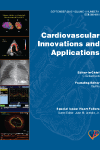
Cardiovascular Innovations and Applications
Bridging the gap between research and practice in cardiovascular medicine.Cardiovascular Innovations and Applications is a premier open-access journal dedicated to advancing knowledge in the field of cardiovascular medicine. Published by COMPUSCRIPT since 2016, this journal provides a platform for the dissemination of innovative research and applications that address crucial topics in cardiology, aiming to bridge the gap between clinical practice and cutting-edge research. With an ISSN of 2009-8618 and an E-ISSN of 2009-8782, it operates on a global scale, facilitating access to high-quality content without financial barriers. The journal is positioned within the Medicine - Cardiology and Cardiovascular Medicine category, and its current Scopus rank of #321/387 reflects its potential for growth and influence in the academic community, being in the 17th percentile. Researchers, healthcare professionals, and students will find Cardiovascular Innovations and Applications an invaluable resource in their quest for the latest findings and advancements in cardiovascular health and treatment methodologies.
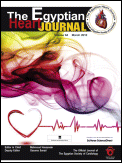
Egyptian Heart Journal
Innovating heart health: your gateway to cutting-edge research.The Egyptian Heart Journal, published by Springer, is a premier open-access journal dedicated to advancing the field of cardiology and cardiovascular medicine. As of 2023, it holds a Q3 classification within the category, showcasing its growing influence within the research community, and ranks 241 out of 387 in Scopus, reflecting a 37th percentile position. With an E-ISSN of 2090-911X, this journal has been open access since 2011, making it easily accessible to researchers, practitioners, and students alike. The journal aims to disseminate high-quality research articles, reviews, and case studies that contribute to the understanding and treatment of cardiovascular diseases. With its focus on innovative and practical solutions in cardiology, the Egyptian Heart Journal plays a critical role in shaping current and future cardiovascular research. Its global outreach and commitment to open access ensure that vital information is available to a wide audience, enhancing both scholarly discourse and clinical practice in the evolving landscape of cardiovascular medicine.